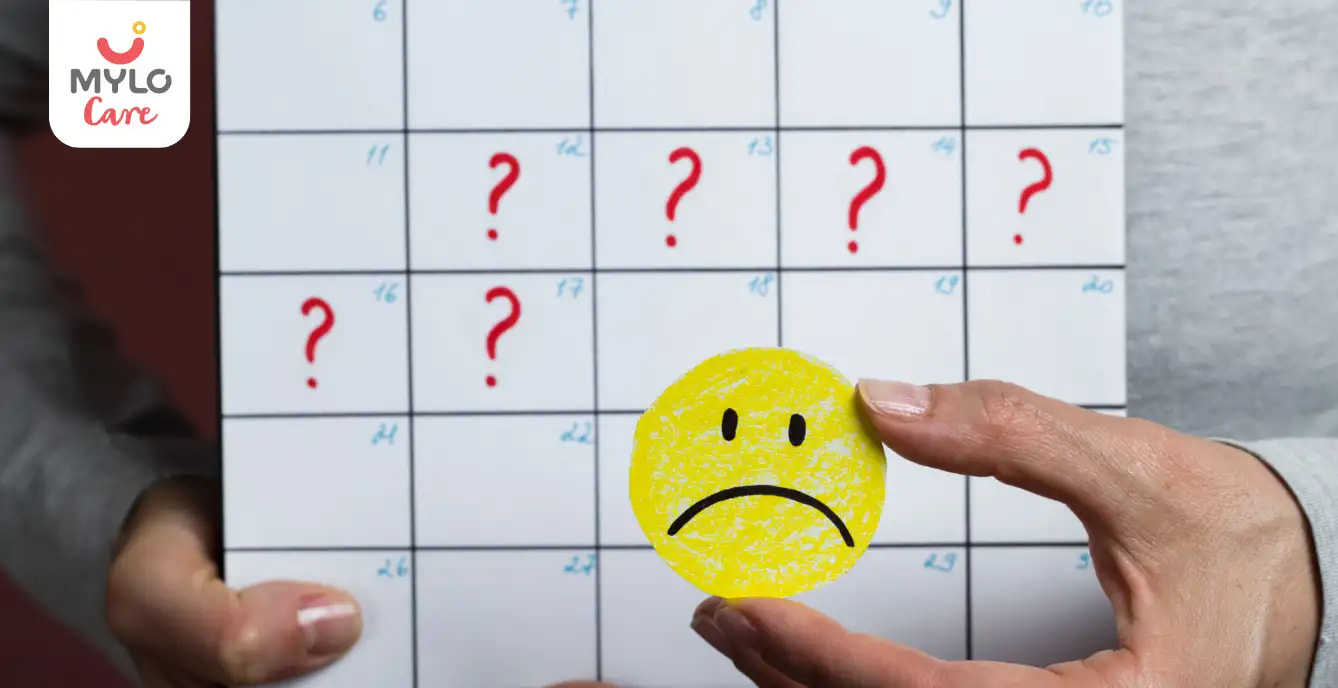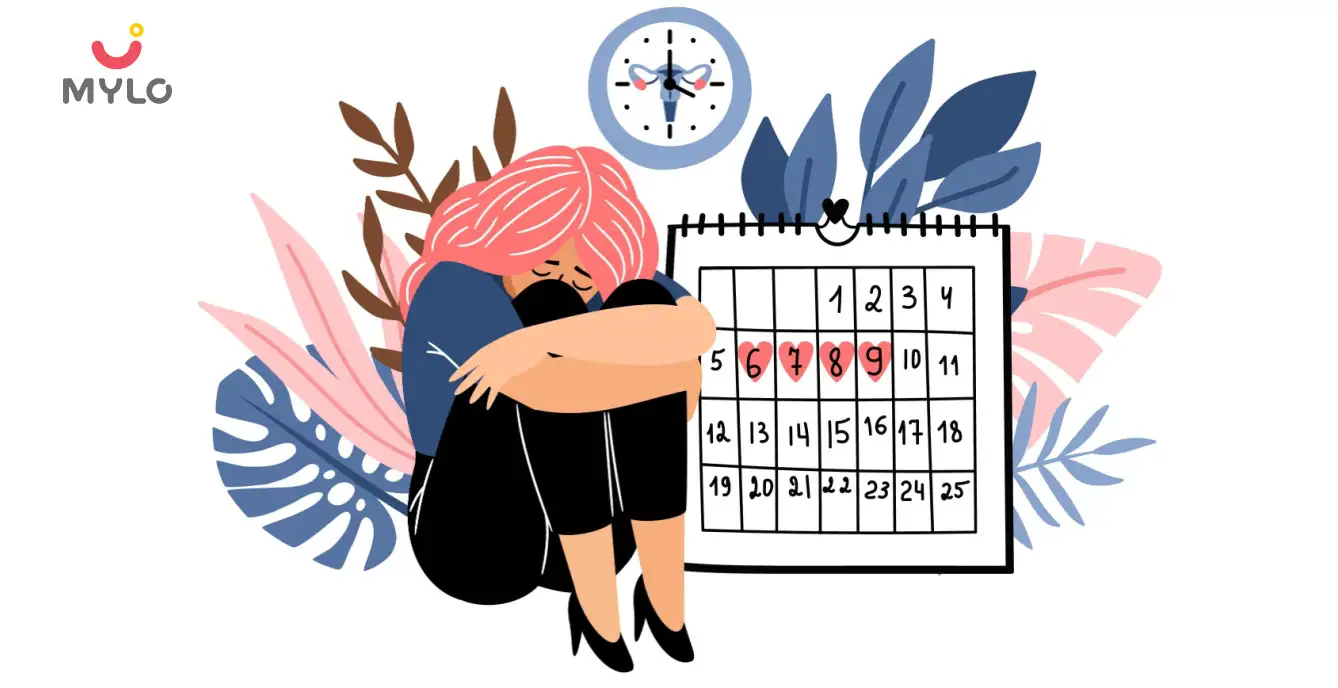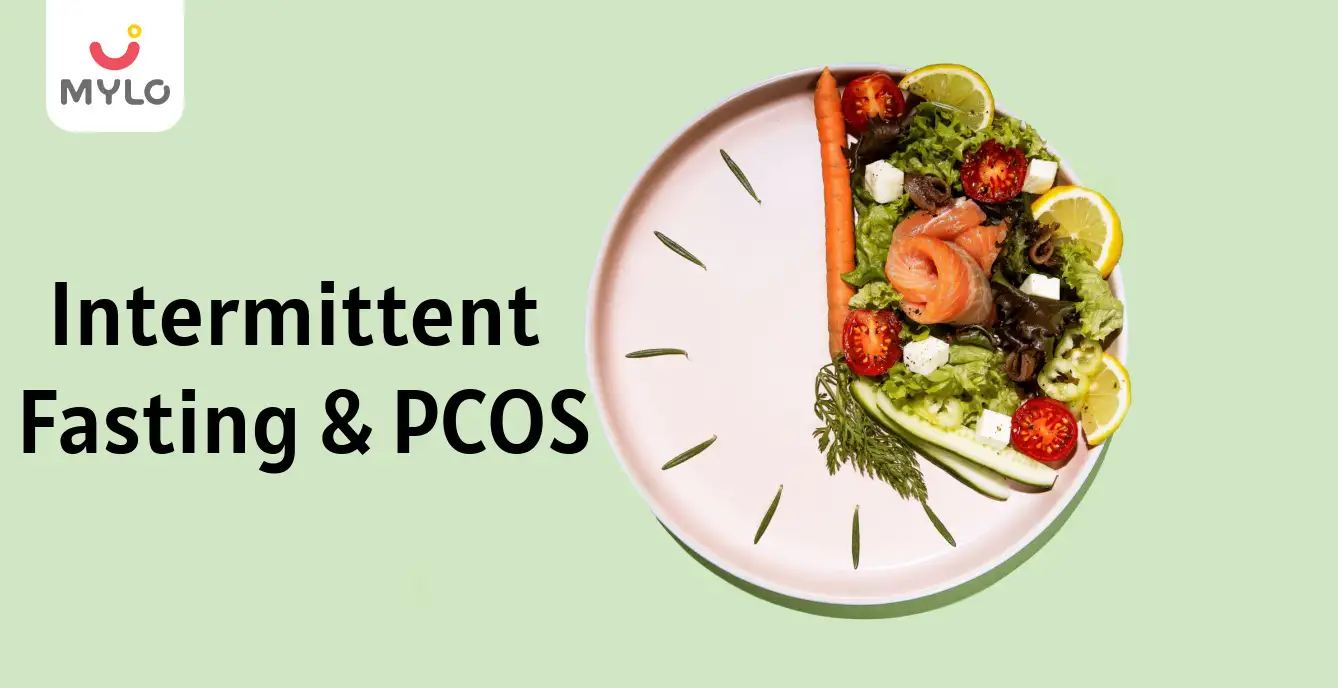Home

Periods

The Ultimate Guide to Understanding the Reasons for Late Period
In this Article

Periods
The Ultimate Guide to Understanding the Reasons for Late Period
Updated on 27 December 2023
Have you ever experienced the panic and confusion that comes with a late period? Don't worry, you're not alone. Menstrual irregularities affect countless women around the world, and there can be a multitude of reasons for late period.
In this article, we'll dive deep into the topic of reasons for delayed periods, explore what to do when periods are late but not pregnant and answer some frequently asked questions about this topic.
How much delay in periods is normal?
The menstrual cycle is a delicate process that can be influenced by various factors. It is important to understand what constitutes a normal delay in periods to alleviate unnecessary worry and stress. Generally, a delay of a few days to a week is considered normal and may occur due to hormonal fluctuations, stress, changes in weight, or travel. However, if the delay extends beyond a week or becomes a recurring pattern, it is advisable to investigate further.
What is the maximum delay in periods if not pregnant?
When a woman is not pregnant, it is normal for her period to arrive within a certain timeframe. The maximum delay in periods, in the absence of pregnancy, can vary from person to person. On average, a delay of up to 35 days is considered within the normal range. However, if the delay exceeds 35 days, it is recommended to consult a healthcare professional to rule out any underlying medical conditions or hormonal imbalances.
10 reasons for delayed periods
There are numerous reasons for a late period that are unrelated to pregnancy. Understanding these factors can help individuals gain insight into their menstrual health and seek appropriate medical advice if necessary.
Here are 10 common reasons for late period:
1. Polycystic Ovary Syndrome (PCOS)
PCOS is a hormonal disorder that affects women of reproductive age. It can cause irregular periods or prolonged delays due to imbalances in hormone levels. Further in the article, we will also understand how long can PCOS delay your period.
2. Urinary Tract Infections (UTIs)
Wondering can urine infection delay periods? In some cases, UTIs can disrupt the menstrual cycle and lead to delayed periods. The infection can cause inflammation and affect the hormone levels responsible for regulating menstruation.
3. Antibiotics
Certain antibiotics can interfere with the effectiveness of hormonal birth control methods, resulting in delayed periods. It is recommended to use additional contraceptive measures while taking antibiotics.
4. Contraceptive Pills
Contraceptive pills are primarily used to regulate periods but can contraceptive pills delay periods? Yes, they can also cause menstrual delays in some individuals. This is especially common during the initial months of starting a new pill or changing the dosage.
5. Stress
Stress can have a significant impact on the menstrual cycle. High levels of stress can disrupt hormone production and lead to delayed or irregular periods.
6. Sudden Weight Changes
Significant weight loss or gain can disrupt the delicate hormonal balance in the body, leading to delayed periods. It is important to maintain a healthy weight for optimal menstrual health.
7. Excessive Exercise
Intense physical activity or excessive exercise can put stress on the body, causing hormonal imbalances. This can result in delayed periods or even the absence of menstruation altogether.
8. Thyroid Disorders
Thyroid disorders, such as hypothyroidism or hyperthyroidism, can disrupt the menstrual cycle and cause delayed periods. These conditions affect hormone production and regulation in the body.
9. Perimenopause
As women approach menopause, their hormone levels fluctuate, leading to irregular periods and delays. This transitional phase, known as perimenopause, can last for several years before menopause occurs.
10. Medications
Certain medications, such as antipsychotics, antiepileptics, or antidepressants, can interfere with the hormonal balance in the body and cause delayed periods as a side effect.
You may also like: What Can Be the Maximum Delay in Periods If Not Pregnant?
What to do when periods are late but not pregnant?
If your periods are late but you are not pregnant, there are a few steps you can take to understand and address the delay:
1. Take a Home Pregnancy Test
While rare, there is still a possibility of pregnancy even if you believe it to be unlikely. Taking a home pregnancy test can help rule out this possibility and provide peace of mind.
2. Monitor and Track
Keep a record of your menstrual cycle, noting the dates and any irregularities. This will help identify patterns and potential triggers for the delay.
3. Assess Lifestyle Factors
Evaluate your lifestyle for any recent changes or stressors that could be affecting your menstrual cycle. Factors such as changes in diet, exercise routines, or work-related stress can contribute to delayed periods.
4. Seek Medical Advice
If the delay persists or becomes a recurring issue, it is advisable to consult a healthcare professional. They can conduct a thorough evaluation, perform necessary tests, and provide appropriate guidance based on your individual circumstances.
You may also like: How to Get Regular Periods Naturally: Ayurvedic Herbs, Lifestyle Changes & Homeopathy
When to see a doctor?
While occasional delays in periods are generally not a cause for concern, there are certain situations where it is advisable to seek medical advice. You should consider consulting a doctor if:
-
Your periods are consistently delayed by more than a week or maximum delay in periods if not pregnant.
-
You have been trying to conceive for more than six months without success.
-
You experience severe pain or discomfort associated with your period.
-
You notice any abnormal bleeding or sudden changes in your menstrual flow.
-
You have other symptoms such as excessive hair growth, acne, or unexplained weight gain.
Remember, a healthcare professional is the best person to evaluate your specific situation and provide appropriate guidance and support.
You may also like: The Ultimate Guide to Safe and Effective Exercise in Periods
FAQs
1. How long can PCOS delay your period?
PCOS can significantly disrupt the menstrual cycle, leading to irregular or delayed periods. The length of the delay can vary from person to person. Some individuals may experience delays of several weeks or even months before their period arrives. It is important to seek medical advice if you suspect PCOS or have concerns about your menstrual health.
2. Can urine infection delay periods?
Urinary tract infections (UTIs) can potentially disrupt the menstrual cycle and cause delayed periods. The infection can lead to inflammation and affect the hormone levels responsible for regulating menstruation. If you suspect a UTI or are experiencing recurring UTIs alongside delayed periods, it is advisable to consult a healthcare professional.
3. Can antibiotics delay period?
Certain antibiotics can interfere with the effectiveness of hormonal birth control methods, leading to delayed periods. It is recommended to use additional contraceptive measures while taking antibiotics to ensure optimal protection against pregnancy. If you are concerned about the impact of antibiotics on your menstrual cycle, consult your healthcare provider.
4. Can contraceptive pills delay periods?
While contraceptive pills are primarily used to regulate periods, they can sometimes cause delays in some individuals. This is more common during the initial months of starting a new pill or changing the dosage. If you experience persistent or prolonged delays in your periods while using contraceptive pills, consult your healthcare provider for further evaluation.
5. Can masturbation delay periods?
There is no scientific evidence to suggest that masturbation can delay periods. Masturbation is a normal and healthy sexual activity that does not directly impact the menstrual cycle.
6. Can yeast infection delay period?
Yeast infections typically do not directly cause delayed periods. However, the symptoms associated with a yeast infection, such as itching, irritation, or inflammation, can sometimes be mistaken for menstrual symptoms.
Key Takeaways
Understanding the reasons for late period is crucial for maintaining optimal menstrual health. While occasional delays are normal, persistent or prolonged delays may indicate underlying medical conditions or hormonal imbalances. Factors such as PCOS, urinary tract infections, stress, and certain medications can all contribute to delayed periods. It is important to track your menstrual cycle, monitor any changes, and seek medical advice if necessary. Take charge of your menstrual health and prioritize your overall well-being.
References
1. Mittiku YM, Mekonen H, Wogie G, Tizazu MA, Wake GE. (2022). Menstrual irregularity and its associated factors among college students in Ethiopia, 2021. Front Glob Womens Health.
2. Bae J, Park S, Kwon JW. (2018). Factors associated with menstrual cycle irregularity and menopause. BMC Womens Health.
3. Sher N. (1946). Delayed Menstruation: Causes and Treatment. Br Med J.



Written by
Anupama Chadha
Anupama Chadha, born and raised in Delhi is a content writer who has written extensively for industries such as HR, Healthcare, Finance, Retail and Tech.
Read MoreGet baby's diet chart, and growth tips

Related Articles
Related Questions
Influenza and boostrix injection kisiko laga hai kya 8 month pregnancy me and q lagta hai ye plz reply me

Hai.... My last period was in feb 24. I tested in 40 th day morning 3:30 .. That is faint line .. I conculed mylo thz app also.... And I asked tha dr wait for 3 to 5 days ... Im also waiting ... Then I test today 4:15 test is sooooo faint ... And I feel in ma body no pregnancy symptoms. What can I do .

Baby kicks KB Marta hai Plz tell mi

PCOD kya hota hai

How to detect pcos

RECENTLY PUBLISHED ARTICLES
our most recent articles

Menstrual Cycle
What Can Be the Maximum Delay in Periods If Not Pregnant?

Black Period Blood: Is It Normal or a Cause for Concern?

PCOS & PCOD
Lean PCOS: A Comprehensive Guide on Causes, Symptoms and Treatment

Mood Swings
PCOS Mood Swings: The Ultimate Guide to Causes and Strategies for Relief

PCOS & PCOD
PCOS and Thyroid: Understanding the Complex Relationship and Finding Solutions

PCOS & PCOD
Intermittent Fasting & PCOS: The Ultimate Guide to Benefits, Risks and Precautions
- Insulin Resistance & PCOS: A Comprehensive Guide to Causes and Management
- Your heart stops beating when your baby feels breathless! Here are 5 things to know about infant breathlessness.
- Newborn Crying: What It Means and How to Handle It?
- When Do Babies Make Eye Contact: Keeping an Eye on Important Milestones
- Is your baby getting breathless frequently? Five things you must know
- 50 Budget-Friendly Birthday Return Gift Ideas to Wow Your Guests
- PCOS Exercise: Your Guide to Sweating Away PCOS
- PCOS and Pregnancy: How to Manage PCOS on the Path to Parenthood
- PCOS Tests: The Power of Diagnostic Tests in Your Health Journey
- Must-Read Ruskin Bond Short Stories for Little Minds
- The Top 10 Tenali Raman Stories You Must Read to Your Kids
- Ovulation Bleeding: The Ultimate Guide to Causes, Symptoms and Management
- A Guide to Recognizing Symptoms of Ovulation After HCG Injection
- Bulky Ovaries Explained: What Every Woman Should Be Aware Of


AWARDS AND RECOGNITION

Mylo wins Forbes D2C Disruptor award

Mylo wins The Economic Times Promising Brands 2022
AS SEEN IN
















- Mylo Care: Effective and science-backed personal care and wellness solutions for a joyful you.
- Mylo Baby: Science-backed, gentle and effective personal care & hygiene range for your little one.
- Mylo Community: Trusted and empathetic community of 10mn+ parents and experts.
Product Categories
baby carrier | baby soap | baby wipes | stretch marks cream | baby cream | baby shampoo | baby massage oil | baby hair oil | stretch marks oil | baby body wash | baby powder | baby lotion | diaper rash cream | newborn diapers | teether | baby kajal | baby diapers | cloth diapers |




